The Value of Vertical Search for B2B Marketers
Excellent analysis from the latest eCommerce Times:
The ability of specialized online marketplaces to generate intelligence-rich, contactable and highly measurable sales leads is nothing short of profound, and those marketers who are already on this bandwagon have been reaping the benefits.
A true vertical search engine is based on three fundamental principles.
First, a vertical search engine is all about context. In this regard a good vertical engine can divine the user's probable intent, unlike a mass market engine. For example, when an engineer queries for "gyros" they are not expecting Greek sandwiches to be returned in the search results. They expect the context to be all about engineering.
The second principle is organization. A vertical engine should ideally be organized to align with workflow and job tasks of the user. Think of an "information cockpit" for a specialized user group.
The third principle is that of access. By this we mean that a good vertical engine must be complete, and that means that it must provide the user with access to content from both the open, hidden and dark Web. The index of a vertical engine therefore must contain hard-to-find (hidden) content and important content off limits to mass market crawlers.
http://www.ecommercetimes.com/

